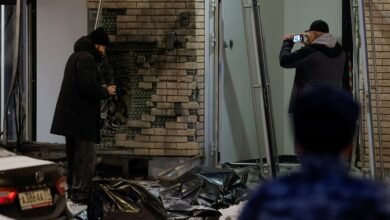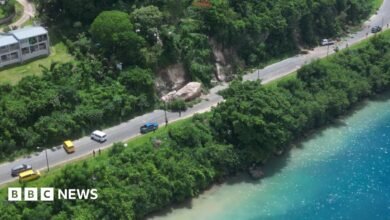Nigerians decry ‘anti-poor’ measures in new protests against the government | Protests News

Ilorin and Abuja, Nigeria – For the second time in two months, angry protesters in several cities across Nigeria are trooping out to denounce biting economic hardship in the West African country and to call for change.
In the capital Abuja on Tuesday, police fired tear gas canisters into crowds of demonstrators as they marched and screamed chants of “no more hunger” and “end bad governance”.
In the first wave of protests in August, several people were shot dead and hundreds more were arrested. Yet this time, despite fears of another crackdown as police deployed heavily to potential protest locations nationwide, demonstrators were determined to be heard.
“The ordinary people are suffering, but this government doesn’t care because they cannot feel the pulse of the ordinary people,” Juwon Sanyaolu, leader of the Take it Back movement, an advocacy organisation at the forefront of the protests, told Al Jazeera from Abuja.
Organisers timed Tuesday’s demonstrations to coincide with the country’s 64th Independence Day celebrations, marking Nigeria’s freedom from former colonial ruler Britain in 1960. However, many say there’s very little to celebrate when large numbers of the 200 million population struggle to survive while government officials are living large.
Tagged #FearlessInOctober, the protests’ demands, Sanyaolu said, were for the government to end hunger by discarding fiscal measures recommended by the World Bank that have led to higher fuel prices – measures the activist called “anti-poor”.
“Why will they keep listening and dancing to the tune of these foreign interests while undermining Nigerians? We don’t consider government officials as gods and we don’t exist to serve their greediness. They should serve us and that’s why we’re going to keep marching,” Sanyaolu said.
Agitators are also demanding that higher electricity prices be reduced and that protesters arrested at past demonstrations be released.
Only small groups of protesters remained in Abuja after the police forcefully dispersed them. However, a larger number of people gathered in parts of Lagos, the economic capital, despite the presence of menacing, gun-toting security officials.
[IN PICTURES]: People march through the streets of Ikeja, Lagos, during the #FearlessInOctober protests. pic.twitter.com/RvRm7DPq7U
— News Central TV (@NewsCentralTV) October 1, 2024
In Ilorin, a small city some 300km (186 miles) north of Lagos, a swarm of police and paramilitary officers stayed for hours in the city centre, where protests were meant to be held. Their presence appeared to deter congregating. One plainclothes security official told Al Jazeera he and his team were there to “monitor” any demonstrations.
People milled around and several clothing stores in the area opened as usual. Ahmad, a mobile point of sales (POS) operator who camped close to the planned protest point, said he would join the demonstrators only if enough people assembled.
“People are just too scared here,” he said in Yoruba, his face twisted in a scowl. “But everything about Nigeria is painful,” he added, bemoaning the high cost of living in a country where the minimum monthly wage was only recently increased from 30,000 ($18) to 70,000 naira ($42).
“Every day I go home from work, I have to start thinking because it costs me about 1,000 naira ($0.60) when it used to cost me way less. This morning, I could not even buy bean cakes to eat with my bread because they were ridiculously expensive and tiny,” Ahmad said.
Biting prices
In the past year, tottering inflation has sent food prices tripling, making it difficult for many people to afford three meals per day.
Garri, the Nigerian staple made from cassava, which is traditionally the cheapest of raw foods, has become a luxury, many say. A bag of rice, another major staple, cost around 26,000 naira ($15) in September 2022 but now costs nearly 100,000 naira ($60).
A cocktail of factors including the effects of COVID-19, mismanagement, and insecurity contributed to the economy reaching its deepest recession in four decades in 2020, analysts say.
However, since President Bola Ahmed Tinubu took office in May 2023 and immediately imposed World Bank-recommended fiscal measures as detailed in his inaugural speech, those conditions have worsened dramatically, according to experts.
Tinubu, in the speech, announced the removal of a fuel subsidy that had been in place for decades, and unified foreign exchange markets. Since then, the naira has lost more than 50 percent of its value, making imports expensive.
Already, local food production had dipped, largely because farmers in the country’s food-producing northern regions face attacks from armed groups like Boko Haram. Wastage from poor storage facilities as well as high transportation costs have also affected local supply chains.
“There were no cushion policies for people, so it was like a triple shock,” Dumebi Oluwole, an economist with the Lagos-based think tank Stears, told Al Jazeera, referring to Tinubu’s approach.
Although Nigeria produces crude oil, it has no functional refineries, and past governments heavily subsidised imports of refined petroleum products to appeal to the masses. That practice was unsustainable, but the subsidies were meant to have been removed gradually, Oluwole said.
The World Bank has since last year signed over $6.52bn in relief funding to Tinubu’s administration, including the latest $1.57bn package released last Thursday. The package is billed to help the country boost healthcare and strengthen climate resilience.
Officials have in recent months doubled the minimum wage and claim to have targeted about 75 million people for cash transfers of about 25,000 naira ($15). Tinubu has also cut down on his travel entourage to reduce costs and government spending, but critics say those measures don’t go far enough. The World Food Programme says close to 26.5 million people in Nigeria face food insecurity in 2024, up from close to 19 million in 2023.
The Central Bank of Nigeria (CBN), too, has attempted to tackle the high inflation by increasing interest rates several times; however, results are still marginal for ordinary people, Oluwole said.
It’s the seeming lack of empathy from the government that makes things worse for many people, Oluwole said, referring to reports of a 21 billion naira ($12.5m) renovation project for Vice President Kashim Shettima’s official villa, and President Tinubu’s purchase of a new plane in August.
“There was a slight dip in food inflation because we are in the harvest season [but] if you do a pulse check people are still feeling the brunt and purses are squeezed,” Oluwole said.
“Even with the new wages, when you discount inflation, people are still back to the same thing they are earning. There’s only so much the CBN can do if Nigeria is not producing enough, if investors are not confident, and if the farms are not secure. If they were to focus their resources on securing the farms rather than deterring protests, we’d probably see better results.”
In a televised broadcast on Tuesday, Tinubu said security officials were eliminating armed group leaders and that food production would soon “leap”.
“I plead for your patience as the reforms we are implementing show positive signs, and we are beginning to see light at the end of the tunnel,” he said.
Rights abuses rife under Tinubu
Protesters on Tuesday marched despite risks of being shot at or arrested, as human rights groups say security forces routinely using brute force to attempt to end anti-government protests and stifle the voices of ordinary people.
During the August 1 to 10 nationwide demonstrations, violence broke out in many parts of the country, including Abuja and northern Kano city, after some demonstrators burned government buildings and vandalised street lamps and other infrastructure.
Security forces also opened fire on groups of protesters. At least 13 people were killed, with many others injured. About 124 people were arrested and many remain in detention. In September, 10 of them were charged with incitement to violence, attempts to topple the government, and treason – an offence punishable by death. The heavy charges have led to a loud uproar from rights groups.
Deji Adeyanju, a human rights activist and a lawyer representing all of those arrested, including the 10 now facing charges of treason, told Al Jazeera the charges were calculated to be severe and threatening to scare people away from protests.
“The government does not tolerate dissent or criticism,” said Adeyanju, a staunch critic of the Tinubu government, while confirming that some of those arrested earlier were also at Tuesday’s demonstrations. “By arresting people and charging them like this, they believe that people will be scared and will not want to protest – that’s their goal.”
Although capital punishment is legal, Nigeria has not executed a death sentence since 2016.
Rights groups say President Tinubu’s crackdown on dissent is particularly “disappointing” given his history as a pro-democracy fighter who faced down many military rulers as a lawmaker during the 1980s and 90s, when Nigeria still faced a crisis of military dictatorships.
In 2020, under former President Muhammadu Buhari – a one-time military leader – police officials opened fire on young people protesting police brutality, in what’s now known as the EndSARS protests, about a now-disbanded notorious police unit known as the Special Anti-Robbery Squad (SARS).
“This is right out of the playbook of Nigerian authoritarian leaders – we’d hoped for a different trajectory with this government, but it is business as usual,” Anietie Ewang, Nigeria researcher at Human Rights Watch, said of the crackdowns under Tinubu.
Ewang said nothing was likely to come of the prison charges the August protesters face and that they’ll likely be dropped, but there’s still a lot at stake for those arrested.
“Many have been in detention for over 60 days – you can imagine what that does to their livelihood,” she said. “Even if they drop the charges, they’d have suffered egregiously and this can drag on for months. Of course, the worst option, if the justice system doesn’t work as it should, is that the death penalty is given.”
The government’s stance is not likely to encourage people to exercise their rights to protest going forward, Ewang added.
Meanwhile, protesters on Tuesday said they would not be deterred by the heavy police presence and insisted that if their demands were not fully met, dissent would continue.
“We are not scared by them and we want our demands met unconditionally,” Sanyaolu of the Take it Back movement said. “There are two options – either President Tinubu abandons these policies, or he resigns.”
Fidelis Mbah contributed reporting from Abuja.



